Conversation Piece:
Baritone ALEXANDRU AGACHE
By Bruce Duffie
During the 25 years that I was with WNIB, Classical 97 in
Chicago,
it was my great pleasure to interview many of the musicians who visited
the Windy City. Besides being heard on the radio station, I have
been able to place quite a few in various publications. My
regular
series in The Opera Journal, which began back in 1985, has featured
almost
exclusively Americans who are involved in this grandest of art forms.
This issue is devoted to Giuseppe Verdi, and while there
are, of
course, vast numbers of Americans who would fit nicely, I wanted to
share
with you the chat that I had about a year ago with Alexandru Agache
[pronounced
uh-GAH-keh]. This baritone from Romania has been making an
outstanding
career for himself all over the world, and is noted for his portrayal
of
characters by Verdi.
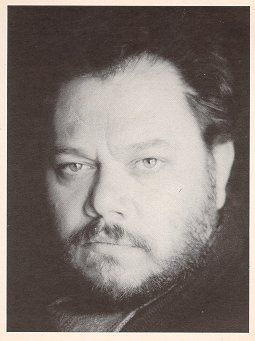 His
live performances in major opera houses all over the world have
endeared
him to audiences, and while his recordings are few, they include two of
the greatest operas where Verdi gives the title of the work to the
baritone
- Simon Boccanegra (on video with Kiri Te Kanawa, conducted by
Sir
Georg Solti), and Rigoletto (on Teldec with Leontina Vaduva,
Richard
Leech and Carlo Rizzi). Agache has also recorded Lucia di
Lammermoor
(with
Edita Gruberova and Richard Bonynge) and Faust (with Jerry
Hadley
and Samuel Ramey) also on Teldec, plus a pair of operas by his fellow
countryman
Nicolae Bretan, on the Nimbus label.
His
live performances in major opera houses all over the world have
endeared
him to audiences, and while his recordings are few, they include two of
the greatest operas where Verdi gives the title of the work to the
baritone
- Simon Boccanegra (on video with Kiri Te Kanawa, conducted by
Sir
Georg Solti), and Rigoletto (on Teldec with Leontina Vaduva,
Richard
Leech and Carlo Rizzi). Agache has also recorded Lucia di
Lammermoor
(with
Edita Gruberova and Richard Bonynge) and Faust (with Jerry
Hadley
and Samuel Ramey) also on Teldec, plus a pair of operas by his fellow
countryman
Nicolae Bretan, on the Nimbus label.
When we talked, he was making his fourth appearance at Lyric
Opera
of Chicago, having given us Germont in La Traviata, plus three
title
characters - Simon Boccanegra, Nabucco, and Rigoletto. In a city
noted for Verdi portrayals by Tito Gobbi, Sherrill Milnes, Piero
Cappuccilli
and others, this is quite an accomplishment. He was quiet and
serious
during most of our meeting, and though a translator was standing by,
she
was only needed for one or two words. He considered his responses
carefully, but allowed his ideas and reflections to flow very smoothly.
Here is that conversation . . . . . . . . .
Bruce Duffie: You are a ‘Verdi Baritone.' Tell
me the
secret of singing Verdi.
Alexandru Agache: I was not always a ‘Verdi
Baritone.'
I also sang Donizetti and Rossini and Mozart. Just in the last
few
years that I've specialized and started to sing more Verdi operas than
others.
BD: Does it please you that you've moved into this
repertoire?
AA: Yes I like it very much because I think my voice
and my
soul is very appropriate to a lot of big characters that you find in
Verdi
operas - like Simon Boccanegra, Nabucco, Luisa
Miller,
Rigoletto.
I like paternal roles that have to do with sentiments of a daughter or
family.
BD: You have family of your own?
AA: Yes, of course. I have two children, but I
am closer
to these parts than other ones. I enjoy Amonasro, for instance,
which
is a more dramatic part. I like doing experiments.
BD: How far can you experiment?
AA: I don't know. (Laughter) I try, I try.
BD: From the roles that your voice can sing, how do
you decide
which to tackle?
AA: As I said, at the beginning, I sang other parts
and other
composers, but step by step I decided to sing more Verdi because it's
better
for my tessitura, for my timbre, and for every sentiment and expression
that I can show. Verdi operas can show dramatic connections on
the
stage. They are not conventional like other operas. You can
believe the stories, and they are written very well musically.
They
are conceived well and the music makes a connection with the
drama.
For instance, Rigoletto is a very complex character and has a lot of
different
facets. It's easier for a singer when there is a lot to
show.
It's more difficult to sing Germont because he's not so
well-defined.
It's beautiful to sing with beautiful arias, but it's not strong enough
and clear enough like Rigoletto or Nabucco.
BD: Does the balance between the music and the drama
shift
in various operas?
AA: Yes, I think so, more than in works by other
composers.
You can find this connection between the music and the drama in Verdi.
BD: Are there any of your parts which are perhaps too
close
to the real Alexandru?
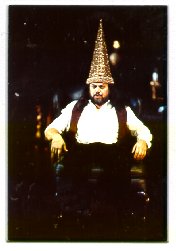 AA:
I think so, yes. Rigoletto inspired me very much because he has
lot
of sarcasm. He's a cynical man, a person without scruples.
But he also has love which is very strange because it's a very deep
personality.
He's also paranoid and schizophrenic. I found him very
interesting
and I have a lot of this part in me.
AA:
I think so, yes. Rigoletto inspired me very much because he has
lot
of sarcasm. He's a cynical man, a person without scruples.
But he also has love which is very strange because it's a very deep
personality.
He's also paranoid and schizophrenic. I found him very
interesting
and I have a lot of this part in me.
BD: Well, we know you have love in your heart, but
are you
also unscrupulous and paranoid???
AA: No, no. I don't want to say that, but it's
fun for
an artist to bring these ideas across on the stage. Not in real
life,
but we can imagine these traits and it's fun to try everything.
BD: You don't have any latent desires to win the girl
in the
end - like the tenor often does?
AA: I don't sing those kinds of roles.
BD: Would you rather?
AA: I don't think so. They're not for me.
I sang
Don Giovanni earlier in my career, but I wasn't the lover. I
brought
out other sides of his character. He doesn't have anything to do
with real love.
BD: He's the one who's unscrupulous!
AA: Yes. What I don't like to sing are the
lover-parts.
I prefer the paternal roles. They're more my style.
BD: When you're onstage, would you rather kill or be
killed?
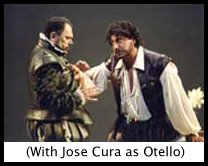 AA:
It depends on the part. When I sing Iago, I have
the desire to destroy Otello. I
don't want to kill him, but I want to see him killed and
destroyed.
It's totally different, but I enjoy it because it's a huge part.
AA:
It depends on the part. When I sing Iago, I have
the desire to destroy Otello. I
don't want to kill him, but I want to see him killed and
destroyed.
It's totally different, but I enjoy it because it's a huge part.
BD: Is there any redeeming quality about Iago?
Anything
good in him?
AA: There's nothing very good in him.. I used
to try
to play him as a normal person who tries to hide the malicious part of
his personality. There's nothing very good in him.
BD: Are there any of your characters that are mostly
or totally
good?
AA: Simon Boccanegra. He's the most pure and I
like
to play that part very much. But when you have to show the same
kinds
of emotions all the time for three hours, it becomes a little
difficult.
When you play Nabucco, there's violence and negativity, but at the end
he becomes very religious. It's very interesting to make such an
experience and show the transformation of the character during the
course
of the performance.
BD: When you walk out onstage, are you portraying the
character,
or do you become that character?
AA: I think sometimes I become him - especially when
I'm totally
with the character and it's in me. When I'm a bit uncertain in myself
about
the personality, then I try to copy ideas, but I'm an intuitive person,
so I try every time to participate in the feelings of each character.
BD: Are you conscious of the audience each night?
AA: Yes, of course. I'm not thinking about
them.
I'm thinking about what I'm doing there and what I'm feeling.
Everything
comes from inside. I try to remember what the director said to me
and I must concentrate on special moments when I have to do
something.
But when I'm doing a character, it's 90% the same each time, no matter
what the production. So there is a generality of what I do with
each
character.
BD: And you have developed those ideas yourself?
AA: Yes, I think so. But I've worked with a lot
of stage
directors and inside me I have a lot of these ideas. I remember
them
and develop them automatically. In each production I have new
experiences
and they become part of me. I cannot control them even if it's
three
years or five years before the next production.
BD: So it's layer upon layer upon layer...
AA: I think so, yes.
BD: Are there any times you want to clear out all of
that
and get back to the core of the character?
AA: Yes, when I'm offered the chance to make him new
and fresh.
It depends on the approach of the production. Here in Chicago,
this
Rigoletto
was a very positive experience. 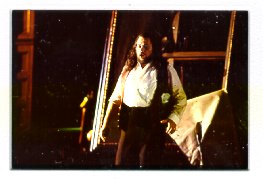 Christopher
Alden has utilized more theatrical movements. I've tried very
much
to change and adapt to his ideas which I've never done before.
I've
done several modern productions of this opera, but this one is very
complex
and I like it very much. It was an experiment for me and I
congratulate
from my heart Mr. Alden. What he did on the stage was a big
theatrical
experiment and I was very happy to see how many ways he developed
characters
that are not so important. For instance, Giovanna. She
became
a fantastic character and it was a joy to see a real theatrical
experiment
on the stage. There are cases where the director is not sure what
he wants to do, so it's very hard for the singer to do something that
is
not well-thought-out. But in this case, Mr. Alden knew from the
beginning
what he wanted to do every moment. It was fantastic for me.
I've had a lot of bad experiences. I won't say where, but
once
I was so angry with myself over what I was forced to do on the stage
that
I couldn't accept the applause at the end. I was so ashamed.
Christopher
Alden has utilized more theatrical movements. I've tried very
much
to change and adapt to his ideas which I've never done before.
I've
done several modern productions of this opera, but this one is very
complex
and I like it very much. It was an experiment for me and I
congratulate
from my heart Mr. Alden. What he did on the stage was a big
theatrical
experiment and I was very happy to see how many ways he developed
characters
that are not so important. For instance, Giovanna. She
became
a fantastic character and it was a joy to see a real theatrical
experiment
on the stage. There are cases where the director is not sure what
he wants to do, so it's very hard for the singer to do something that
is
not well-thought-out. But in this case, Mr. Alden knew from the
beginning
what he wanted to do every moment. It was fantastic for me.
I've had a lot of bad experiences. I won't say where, but
once
I was so angry with myself over what I was forced to do on the stage
that
I couldn't accept the applause at the end. I was so ashamed.
BD: Does this mean that if you're offered another
contract
with that director, you'd turn it down?
AA: No, I don't think so. Most of what I was
forced
to do with the character was not right, but he has worked with symbols
and he had a more general vision about the piece which was not so far
off
the mark.
BD: Without mentioning specifics, are there times
when the
directors asks you to go too far?
AA: Oh yes. I've had some very interesting
experiences
in this matter.
BD: Do you go along with them, or do you walk out?
AA: It's very hard. I know that when a theater
takes
a production, there is approval from the management. I need to be
convinced of what I'm doing even if it's far from traditional. I
must feel what I'm doing is true. I will speak with the producer
or director, and if he can persuade me that it's right, I will do
it.
In opera, the time to just raise your hand and sing is gone. It's
good to hear the fine singing, but with the new movies, especially
those
from Hollywood, audiences are expecting more from the stage, even in
opera.
It's image.
BD: Is the live theater competing with film?
AA: I think there's a big effort in the theater to
make a
convincing style in the productions. Even if the stories are 200
years old, we have experienced history, and stage techniques have
developed
a lot since the death of the composers. We have an obligation to
present the more modern view for the more modern people. Opera
must
attract people who use computers and the internet in this shrinking
world.
BD: Are the operas that you sing for everyone?
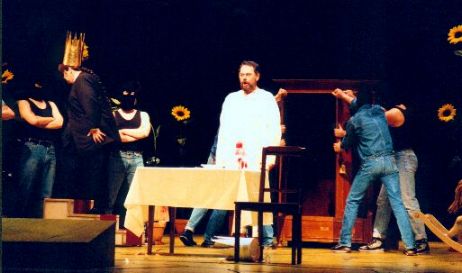
(As Nabucco in Berlin)
AA: Yes, I think so. That's the genius of the
composers,
especially Verdi and Puccini, and those who had more dramatic
conviction.
Verdi understood the human character very well and I think he
understood
very well what theatrical pieces could do and must show to the
people.
He was a precursor of the film director of today because he had
everything
in his mind. He was the first to have this fantastic vision of
the
theater.
BD: Does he ever ask too much?
AA: Oh yes. It's difficult to sing Verdi, and I
have
had some problems at times, but I enjoy singing his works because for
me
it's so real. I like Mozart and others, also, but Verdi is like a
competition. It's hard, it's long, it's high. He's asking
everything
- piano, mezza-voce, forte, vendetta, everything. It's not just
‘stand
there and sing.' It's a lot of participation.
BD: You say it's a competition. Do you always
win?
AA: No. I'm very conscious of that. It's
so close
to the limits of what we can do. Now I'm speaking just of the
baritone
parts, but in each of his operas, the roles are so different.
Nabucco
is very different from Rigoletto, and Simon Boccanegra is different
from
Amonasro. I try every time to find a color for the part, but it's
very difficult.
BD: So each part asks different challenges of you!
AA: I think so. It's very complex. It's
not just
the things you learn singing an aria. The color of voice is very
important to the characterization.
BD: Do you also sing concerts as well as opera?
AA: Not so much. I did earlier, and I did a lot
of modern
music, but now I get mostly offers for Verdi because my voice is so
adaptable
for them - moreso than other parts. But I'm very happy for it.
BD: Do you like singing these roles over and over
again?
AA: Yes, I like it. Earlier, when I had some
problems
having enough voice to ride the large orchestra in the big theaters, I
found a good way to not lose the voice. It's a big effort to sing
Verdi, and one needs to find a way to do them without danger for the
voice
and without too much stress. The stage imposes lots of stress
anyway,
and I must cope - not with the colleagues, but with myself. So,
I've
found ways to do it without danger, so I'm happy. I'm singing
very
well and I enjoy it, so it's a pleasure.
BD: Do you change your technique for the size of the
house?
AA: That's a danger. I sang Nabucco this summer
in the
arena in Verona, and had a very big success. When I sing in
little
theaters, I have more problems than in big ones. But the voice
does
respond differently from house to house because of the acoustics.
I need time to get used to it because I'm not as technical a singer as
others
may be. When I finished my studies in Romania, I did not have a
good
technique, and I needed lots of time to discover what my voice could
really
do.
BD: Are you still discovering?
AA: Yes. I hope someday to be perfect, but it's
not
yet. I'm more pleased now than I was earlier in my career, but I
hope to have enough time to discover the real voice.
BD: Tell me a bit about the Romanian composer Breton.
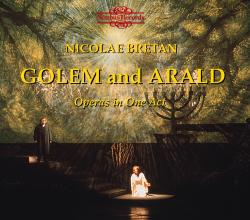 AA:
Ah, Nicolai Breton. I've had the pleasure of singing 2 of his
operas,
which have a lot of musical inspiration not only from Romania, but
also Hungary and Germany. It was a very interesting experience
for
me to make these recordings. My first disc was Arald and
that is the name I gave my son. The other one is Golem.
AA:
Ah, Nicolai Breton. I've had the pleasure of singing 2 of his
operas,
which have a lot of musical inspiration not only from Romania, but
also Hungary and Germany. It was a very interesting experience
for
me to make these recordings. My first disc was Arald and
that is the name I gave my son. The other one is Golem.
BD: Should those operas be done in America as well as
in Romania?
AA: I don't know. There was a production of Golem
in Switzerland, and I know that there are hopes of a production in the
U.S.
BD: Perhaps now, with the use of supertitles, it
could bridge
the gap.
AA: I hope so. There is a Breton Foundation in
Virginia,
and they organize a lot of concerts, but opera is more difficult, and
these
works have large casts.
BD: Do you sing differently for recordings than you
do in
the theater?
AA: No, no. It's another thing, of
course. I sing
without rushing and without pushing.
BD: Are you pleased with your records?
AA: Not always. The Golem was very
good, but
I was much younger. It depends. As I mentioned, I'm an
intuitive
person, so I'm happy, but I'm suffering a lot, also.
BD: Are you optimistic about the future of opera?
AA: I think I am. I see the audiences all over
the world,
and it's a special public that exists for opera. They are very
passionate
about it. I think it has a long future. I have no doubt
about
its possibilities.
BD: Do you still sing new works?
AA: Not any more. When I finished the Academy
of Music
in Cluj in Romania, there were a lot of composers who wanted me to sing
their works. I had a lot of fun with it, but now it would have to
be a very special proposal. I did a small part in the Cantata
Profana of Bartók with Solti.
BD: Let me ask a real easy question – what's the
purpose of
music?
AA: The purpose? To enjoy and to make more
happiness
and to make us think. What the human being cannot say, there is
the
music which can explain or give hope to the people. [Note: at this
point,
Mr. Agache got quite choked up and began speaking more softly.]
When
I was younger and living in Romania under dictatorship, the music was
the
only hope sometimes for me and for other people.
BD: Are you proud that you were part of that hope?
AA: Yes, of course.
BD: Do you have any advice for younger singers coming
along?
AA: Advice is very difficult. They must be very
careful
with the repertoire they sing and not to rush and push the voice.
Don't sing parts that are too long. But they must work and love
music.
If that exists, then everything can come.
BD: Do you leave enough time between engagements for
yourself?
AA: Well, not too much time. A lot of time, I'm
alone.
My wife was here for three weeks and I enjoyed that. She just
left
yesterday, so it's difficult especially with children. We live in
Germany, so when I sing there it's easier to go home for a couple days
and enjoy the fun. But it's my profession and I love it very much.
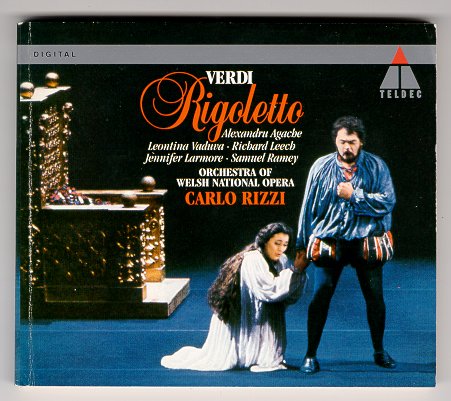
BD: Are you the point in your career you want to be
right
now?
AA: I don't make plans, but I'm very pleased, of
course.
Maybe when I was younger I dreamed more, but now I'm more realistic and
very pleased. It's more positive than negative, so that's very
good.
Otherwise, one can lose one's way.
BD: Thank you for coming again to Chicago!
AA: I love Chicago very much. It's a beautiful
city
and a beautiful public. I congratulate the staff which is so
friendly
and full of attention. This is the fourth time I've been here,
and
I consider it like my home. And I thank you for the interview.
=========
Next time in these pages, a chat with tenor George Shirley.
* *
*
* *
= = = = =
* *
*
* *
Photos as Rigoletto at Lyric Opera of Chicago (except
recording cover)
Published in The Opera Journal December, 2001
©Bruce Duffie
Be sure to visit Bruce's Website
[ www.bruceduffie.com ],
and you can also send him E-Mail
[ duffie@voyager.net ]
 His
live performances in major opera houses all over the world have
endeared
him to audiences, and while his recordings are few, they include two of
the greatest operas where Verdi gives the title of the work to the
baritone
- Simon Boccanegra (on video with Kiri Te Kanawa, conducted by
Sir
Georg Solti), and Rigoletto (on Teldec with Leontina Vaduva,
Richard
Leech and Carlo Rizzi). Agache has also recorded Lucia di
Lammermoor
(with
Edita Gruberova and Richard Bonynge) and Faust (with Jerry
Hadley
and Samuel Ramey) also on Teldec, plus a pair of operas by his fellow
countryman
Nicolae Bretan, on the Nimbus label.
His
live performances in major opera houses all over the world have
endeared
him to audiences, and while his recordings are few, they include two of
the greatest operas where Verdi gives the title of the work to the
baritone
- Simon Boccanegra (on video with Kiri Te Kanawa, conducted by
Sir
Georg Solti), and Rigoletto (on Teldec with Leontina Vaduva,
Richard
Leech and Carlo Rizzi). Agache has also recorded Lucia di
Lammermoor
(with
Edita Gruberova and Richard Bonynge) and Faust (with Jerry
Hadley
and Samuel Ramey) also on Teldec, plus a pair of operas by his fellow
countryman
Nicolae Bretan, on the Nimbus label.
 AA:
I think so, yes. Rigoletto inspired me very much because he has
lot
of sarcasm. He's a cynical man, a person without scruples.
But he also has love which is very strange because it's a very deep
personality.
He's also paranoid and schizophrenic. I found him very
interesting
and I have a lot of this part in me.
AA:
I think so, yes. Rigoletto inspired me very much because he has
lot
of sarcasm. He's a cynical man, a person without scruples.
But he also has love which is very strange because it's a very deep
personality.
He's also paranoid and schizophrenic. I found him very
interesting
and I have a lot of this part in me.
 AA:
It depends on the part. When I sing Iago, I have
the desire to destroy Otello. I
don't want to kill him, but I want to see him killed and
destroyed.
It's totally different, but I enjoy it because it's a huge part.
AA:
It depends on the part. When I sing Iago, I have
the desire to destroy Otello. I
don't want to kill him, but I want to see him killed and
destroyed.
It's totally different, but I enjoy it because it's a huge part.
 Christopher
Alden has utilized more theatrical movements. I've tried very
much
to change and adapt to his ideas which I've never done before.
I've
done several modern productions of this opera, but this one is very
complex
and I like it very much. It was an experiment for me and I
congratulate
from my heart Mr. Alden. What he did on the stage was a big
theatrical
experiment and I was very happy to see how many ways he developed
characters
that are not so important. For instance, Giovanna. She
became
a fantastic character and it was a joy to see a real theatrical
experiment
on the stage. There are cases where the director is not sure what
he wants to do, so it's very hard for the singer to do something that
is
not well-thought-out. But in this case, Mr. Alden knew from the
beginning
what he wanted to do every moment. It was fantastic for me.
I've had a lot of bad experiences. I won't say where, but
once
I was so angry with myself over what I was forced to do on the stage
that
I couldn't accept the applause at the end. I was so ashamed.
Christopher
Alden has utilized more theatrical movements. I've tried very
much
to change and adapt to his ideas which I've never done before.
I've
done several modern productions of this opera, but this one is very
complex
and I like it very much. It was an experiment for me and I
congratulate
from my heart Mr. Alden. What he did on the stage was a big
theatrical
experiment and I was very happy to see how many ways he developed
characters
that are not so important. For instance, Giovanna. She
became
a fantastic character and it was a joy to see a real theatrical
experiment
on the stage. There are cases where the director is not sure what
he wants to do, so it's very hard for the singer to do something that
is
not well-thought-out. But in this case, Mr. Alden knew from the
beginning
what he wanted to do every moment. It was fantastic for me.
I've had a lot of bad experiences. I won't say where, but
once
I was so angry with myself over what I was forced to do on the stage
that
I couldn't accept the applause at the end. I was so ashamed.

 AA:
Ah, Nicolai Breton. I've had the pleasure of singing 2 of his
operas,
which have a lot of musical inspiration not only from Romania, but
also Hungary and Germany. It was a very interesting experience
for
me to make these recordings. My first disc was Arald and
that is the name I gave my son. The other one is Golem.
AA:
Ah, Nicolai Breton. I've had the pleasure of singing 2 of his
operas,
which have a lot of musical inspiration not only from Romania, but
also Hungary and Germany. It was a very interesting experience
for
me to make these recordings. My first disc was Arald and
that is the name I gave my son. The other one is Golem.
